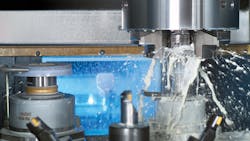When FORGING asked readers to describe the scope of their operations, 70% of the respondents revealed they have onsite machining capability — and nearly 75% of all forging operations we surveyed reported they intend to have the means to perform precision finishing by 2015. It’s not just machining: today’s forgers are full-spectrum product designers and producers, offering capabilities like fabricating and welding, and assembling finished products. They’re forgers, but they’re much more than forging operations. They’re engaged in “manufacturing technology.”
As it happens, manufacturing technology is the label that machining operations have adopted for themselves over the past decade — aiming to describe the array of capabilities that are required for an operation to produce high-value component parts. There is a convergence of purposes here, and more important there is a consolidation of activities.
The most obvious factor driving forging and machining operations together is cost: the value of a product is enhanced significantly if it is delivered to an OEM with as much precision in the final stages of production as there is in its design and manufacturing.
But beyond money, important engineering issues are converting forgers into machining specialists. First, materials are more highly engineered, and higher-value, and difficult-to-machine for the average job shop. The forger that understands the material’s specifications might just as well complete the job. This is especially recognizable in markets like aerospace and defense, where the proprietary features of materials are increasingly important to successful machining.
But, successful machining demands at least as much planning and preparation as other “manufacturing technologies.” According to Prof. Dr.-Ing. Eberhard Abele, head of the Institute for Production Management, Technology and Machine Tools (PTW) at Germany’s Darmstadt Technical University, the principal technological challenges for manufacturers now and in the near future will be mastering cost-effective, reliable machining of new materials and products.
“The next few years in aerospace will be characterized by composite materials, but also by the increased use of titanium materials,” he said “Machining of these materials calls for new tool technologies, especially also new machine tool configurations, which have been optimized to machine these materials.”
Integrating different production processes is another important trend, and Abele indicated this is an opening for manufacturers to demonstrate improvements. “Retooling and set-up time is reduced, production times are shortened and potential defects are reduced,” the professor said, “and this helps substantially to lower unit costs,” according to the professor.
Abele noted this point is closely related to many of the questions directed to his research center. “Ultimately, it’s always a question of the productivity and quality of a metal cutting process, firstly production technology aspects such as the design of tools and production processes, and secondly new spindle developments and the use of industrial robots for simpler machining tasks,” he said.
Machine Designers and Builders...
Machine designers and builders are up to the task. Recent years have seen the introduction of a full portfolio of process capabilities, none more important than “multi-tasking” — combining several different machining technologies and processes on a single platform.
High-speed cutting is another technology that’s changing machining: cutting materials are growing more effective, and cost-effective, to match the hardness of materials.
Advances in automation and process control are important to the effort, too. In particular, multi-core processing is allowing machines to digest increasingly higher volumes of data and to manage it speedily and effectively. It’s the reason that multi-tasking machines can execute tasks as programmed, in three-, five-, seven- or more axes, as component parts increase in complexity.
“Manufacturing technology” also has been assumed into the title of the most important exhibition this year, the International Manufacturing Technology Show in Chicago, September 10-15. (www.imts.org). All of the current developments and emerging trends in machining, for forge shops or any shop, will be on exhibit.
IMTS is largest and longest-running trade show for manufacturing in the U.S., and takes place every other year at Chicago’s McCormick Place. It’s forecast to draw more than 80,000 visitors from an estimated 120 countries. Undoubtedly many of those visitors will represent forging operations, manufacturers interested to learn the technologies and systems available to help their enterprises grow — and to learn what trends may drive that growth.
We know from our research that FORGING readers are lined up to supply the most dynamic downstream markets: aerospace (44%), automotive (36%), defense (40%), heavy equipment/commercial trucks (50%), medical/surgical equipment (12%), and power generation industries (13%). They have the same interest to learn the ideas shaping their supply chain and the trends emerging about their markets in the future.
About the Author
Robert Brooks
Editor/Content Director - Endeavor Business Media
Robert Brooks has been a business-to-business reporter, writer, editor, and columnist for more than 20 years, specializing in the primary metal and basic manufacturing industries. His work has covered a wide range of topics including process technology, resource development, material selection, product design, workforce development, and industrial market strategies, among others.
Currently, he specializes in subjects related to metal component and product design, development, and manufacturing—including castings, forgings, machined parts, and fabrications.
Brooks is a graduate of Kenyon College (B.A. English, Political Science) and Emory University (M.A. English.)

